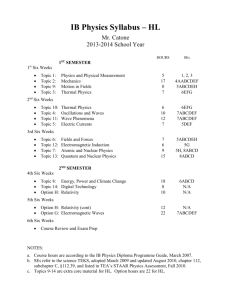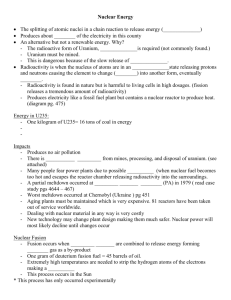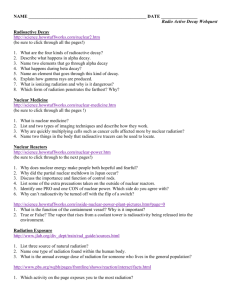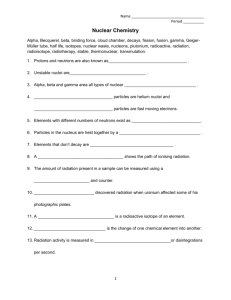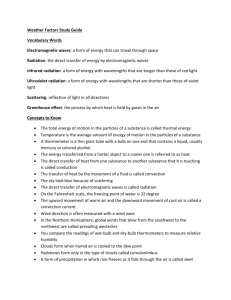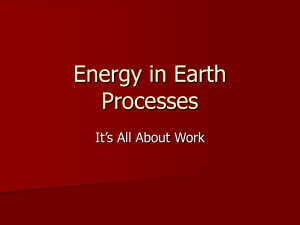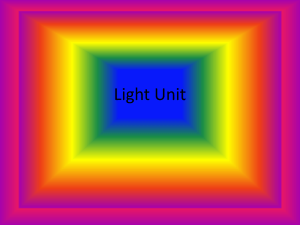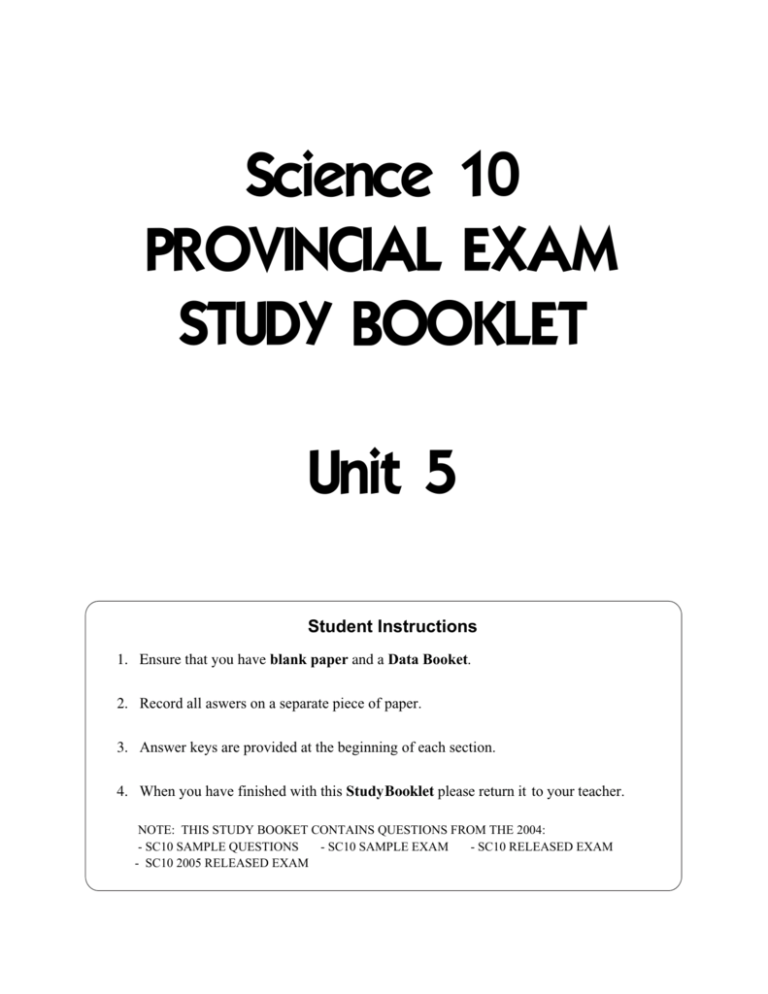
Science 10
PROVINCIAL EXAM
STUDY BOOKLET
Unit 5
Student Instructions
1. Ensure that you have blank paper and a Data Booket..
2. Record all aswers on a separate piece of paper.
3. Answer keys are provided at the beginning of each section.
4. When you have finished with this Study Booklet please return it to your teacher.
NOTE: THIS STUDY BOOKET CONTAINS QUESTIONS FROM THE 2004:
- SC10 SAMPLE QUESTIONS
- SC10 SAMPLE EXAM
- SC10 RELEASED EXAM
- SC10 2005 RELEASED EXAM
SCIENCE 10 SAMPLE QUESTIONS
UNIT 5 RADIOACTIVITY
UNIT 5 RADIOACTIVITY
KEY: 71. A 72. C 73. B 74. D 75. D 76. C 77. D 78. B 79. B 80. C 81. A 82. D
RECORD YOUR ANSWERS ON A SEPARATE PIECE OF PAPER
F. PHYSICAL
SCIENCE
(Radioactivity)
10F1 – summarize the characteristics of the major components of the
electromagnetic spectrum
∑ characteristics include relative wavelength and frequency
Knowledge
Prescribed Learning Outcomes – 10F1
71. Visible light is part of the electromagnetic spectrum.
A. True
B. False
REFER TO
DATA BOOKLET
Use The Electromagnetic Spectrum on page 6 of the Data Booklet
to answer question 72.
Understanding
Prescribed Learning Outcomes – 10F1, 10A4
72. Which of the following electromagnetic waves have the lowest frequency?
A.
B.
C.
D.
Microwaves
FM radio waves
AM radio waves
Green light waves
F. PHYSICAL
SCIENCE
(Radioactivity)
10F2 – differentiate among the following major decay products:
alpha ( a ) and beta ( b ) particles, gamma ( g ) rays
∑ including recognizing nuclear equations
∑ including half-life
Knowledge
Prescribed Learning Outcomes – 10F2
73. Which of the following has the same mass as a beta particle?
A.
B.
C.
D.
a proton
an electron
a gamma ray
an alpha particle
Assessment Department (Issued September 2004)
- 33 -
Science 10 – Sample Questions
Understanding
Prescribed Learning Outcomes – 10F2
Use the following legend to answer questions 74 and 75.
+ = proton
= neutron
= electron
74. Which of the following represents an alpha particle?
A.
B.
+
C.
+
D.
+
+
Higher Mental Processes
Prescribed Learning Outcomes – 10F2
75. Which of the following describes the changes that take place in the nucleus of an atom as a
result of gamma (g) decay?
Number of Protons
Number of Neutrons
A.
increase by 1
decrease by 1
B.
increase by 2
decrease by 2
C.
decrease by 2
decrease by 2
D.
no change
no change
F. PHYSICAL
SCIENCE
(Radioactivity)
10F3 – compare and contrast fusion and fission reactions and their use in
energy production (e.g. plutonium, U-238, U-235)
∑ including recognizing nuclear equations
Knowledge
Prescribed Learning Outcomes – 10F3
76. Which of the following joins two small nuclei to make one larger nucleus?
A.
B.
C.
D.
binary fusion
binary fission
nuclear fusion
nuclear fission
Assessment Department (Issued September 2004)
- 34 -
Science 10 – Sample Questions
Understanding
Prescribed Learning Outcomes – 10F3
77. Which of the following is a nuclear fission reaction?
A. UF6 Æ U + 3F2
B.
255
100 Es
C.
238
92 U
D. n +
255
101Fm
Æ
Æ
234
90 Th
235
92 U
Æ
+b
+a
141
56 Ba
+
92
36 Kr
+ 3n
Higher Mental Processes
Prescribed Learning Outcomes – 9A9, 10F3
Use the following letter from World War II to answer question 78.
Sir:
Some recent work by E. Fermi and L. Szilard, which has been
communicated to me in manuscript, leads me to expect that the element
uranium may be turned into a new and important source of energy in the
immediate future….I believe, therefore, that it is my duty to bring to your
attention the following facts and recommendations.
In the course of the last few months, it has been made probable—through
the work of Joliot in France as well as Fermi and Szilard in America—thus
it may become possible to set up nuclear chain reactions in a large mass of
uranium, by which vast amounts of power…would be generated. Now it
appears almost certain that this could be achieved in the immediate future.
This new phenomenon would also lead to the construction of bombs. A
single bomb of this type, carried by boat or exploded in a port, might very
well destroy the whole port together with some of the surrounding territory.
I understand that Germany has actually stopped the sale of uranium from
the Czechoslovakian mines which she has taken over. That she should have
taken such early action might well be understood on the ground that the son
of the German Undersecretary of State, von Weizsacker is attached to the
Kaiser Wilhelm Institute of Berlin, where some of the American work on
uranium is now being repeated.
Yours very truly,
A. Einstein.
78. The energy referred to by Einstein is produced by which of the following?
A.
B.
C.
D.
fusion
fission
exothermic chemical reactions
uranium spontaneously decomposing
Assessment Department (Issued September 2004)
- 35 -
Science 10 – Sample Questions
F. PHYSICAL
SCIENCE
(Radioactivity)
10F4 – describe technological applications of radiation
∑ technological applications will include, but are not limited to,
1) home (e.g. microwave ovens, smoke detectors, TV)
2) medical (e.g. X rays, cancer therapy, nuclear medicine)
3) industry (e.g. structural flaw detection)
4) scientific (e.g. carbon dating)
5) recreational (e.g. tanning machines)
Knowledge
Prescribed Learning Outcomes – 10F4
79. Which of the following are used in the identification and treatment of cancer?
A.
B.
C.
D.
I
X rays
II
gamma rays
III
ultra-violet rays
IV
microwaves
I only
I and II
II and III
III and IV
Assessment Department (Issued September 2004)
- 36 -
Science 10 – Sample Questions
Understanding
Prescribed Learning Outcomes – 10F4, 10G3, 10A4, 8A5
Use the following graph which shows the radioactive decay
of Uranium-238 to Lead-206 to answer question 80.
1.300
1.200
1.100
1.000
0.900
Pb–206 0.800
U–238 0.700
0.600
0.500
0.400
0.300
0.200
0.100
0.000
0.0
1.0
2.0
3.0
4.0
5.0
6.0
Time (billions of years)
80. What is the approximate age of a sample when the
A.
B.
C.
D.
Pb - 206
is equal to 0.40?
U - 238
1.0 billion years
1.3 billion years
2.2 billion years
3.8 billion years
Assessment Department (Issued September 2004)
- 37 -
Science 10 – Sample Questions
F. PHYSICAL
SCIENCE
10F5 – evaluate the effects of radiation on living organisms
(Radioactivity)
Knowledge
Prescribed Learning Outcomes – 10F5
81. Skin cancer can be caused by exposure to ultraviolet radiation.
A. True
B. False
Understanding
Prescribed Learning Outcomes – 10F5
82. In 1986, a nuclear reactor in Chernobyl experienced a meltdown and leaked radiation to the
surrounding area. There have since been widespread effects due to this radiation. Which of the
following was not directly caused by the radiation?
A.
B.
C.
D.
leukemia
thyroid cancer
contaminated crops
outbreak of influenza
Assessment Department (Issued September 2004)
- 38 -
Science 10 – Sample Questions
SCIENCE 10 SAMPLE EXAM QUESTIONS
UNIT 5 RADIOACTIVITY
ANSWER KEY: 78. B 79. D 80. C 81. C 82. B 83. A 84. D 85. B 86. A
RECORD ANSWERS ON A SEPARATE SHEET OF PAPER
PHYSICAL SCIENCE
Radioactivity
For this section of the examination, refer to:
∑ The Periodic Table on page 3
∑ The Electromagnetic Spectrum on page 5
∑ Common Isotope Pairs on page 5
REFER TO
DATA BOOKLET
78. Which of the following types of radiation has the highest energy?
A.
B.
C.
D.
microwaves
gamma rays
infrared waves
ultraviolet rays
79. Which of the following statements are true?
A.
B.
C.
D.
I
Radio waves are sound waves.
II
All electromagnetic waves are visible.
III
Waves with a short wavelength have a low frequency.
IV
Waves with a short wavelength have a high frequency.
V
Gamma rays have a shorter wavelength than visible light.
I and II
I and III
III and V
IV and V
- 27 -
80. What is the charge on an alpha (a) particle?
A.
B.
C.
D.
–2
0
+2
+4
81. Which decay product will be attracted to a positively-charged surface?
A.
B.
C.
D.
neutron
gamma ray
beta particle
alpha particle
82. What is the process called when uranium-235 absorbs a neutron and then breaks apart into
smaller pieces?
A.
B.
C.
D.
a fusion reaction
a fission reaction
a synthesis reaction
a decomposition reaction
83. What new isotope forms when
A.
99
43Tc
B.
98
42 Mo
C.
93
41Nb
D.
96
42 Mo
99
42 Mo
decays by emitting a beta (b) particle?
- 28 -
Read the following article about the storage of nuclear waste
to answer questions 84 and 85.
Nuclear Fallout
The federal government gave Yucca Mountain, Nevada,
(U.S.A.) a preliminary thumbs-up as [the] nation’s nuclear
waste repository in February, despite critics’ contentions that it
would leak radioactive waste into surrounding soil and water.
Government scientists acknowledge that the waste will seep
out, but not, they say, for tens of thousand of years, at which
point the radioactivity will have subsided to safe levels. The
volcanic rock is full of fissures [cracks]—which turns out to be
a problem because rainwater could seep in through them and
corrode the nickel-chromium-molybdenum waste containers.
adapted/condensed from Popular Science, January 2003, page 75
84. According to the article, how does rainwater reach the radioactive waste
containers?
A.
B.
C.
D.
by volcanic activity
by landslides on Yucca Mountain
by a cave-in at the nuclear waste repository
by travelling through fissures or cracks in the volcanic rock
85. After reading the article, predict why rainwater corrosion of the waste
containers is hazardous?
A.
B.
C.
D.
Rainwater and radioactive material will undergo a nuclear reaction.
Leaking radioactive materials will cause environmental contamination.
Leaking radioactive gases will escape through fissures into the atmosphere.
Rainwater will cause a steam explosion when heated by the radioactive waste.
86. The isotope carbon-14 is used for radioactive carbon dating.
A. True
B. False
- 29 -
SCIENCE 10 2004 RELEASED EXAM QUESTIONS
UNIT 5 RADIOACTIVITY
INSTRUCTIONS: For each question, select the best answer and record your choice ona separate
piece of paper.
ANSWER KEY: 81. B 82. A 83. B 84. C 85. A 86. A 87. D 88. B
PHYSICAL SCIENCE
REFER TO
DATA BOOKLET
RADIOACTIVITY
For this section of the examination, refer to:
∑ the Periodic Table of the Elements on page 3
∑ The Electromagnetic Spectrum on page 6
∑ the Common Isotope Pairs Chart on page 6
81. Visible light has a longer wavelength than television signals.
A. True
B. False
82. In alpha (a) decay, a nucleus loses 2 protons and 2 neutrons.
A. True
B. False
83. Consider the following nuclear equation.
7
4 Be
+
0
–1 e
Æ
The equation shows beryllium undergoing beta decay.
A. True
B. False
7
3 Li
84. Which of the following describes the changes that take place in the nucleus of an atom as a
result of beta (b) decay?
number of protons
number of neutrons
A.
decrease by 1
increase by 1
B.
no change
no change
C.
increase by 1
decrease by 1
D.
increase by 2
decrease by 2
85. Which of the following uses or produces nuclear energy?
A.
B.
C.
D.
I
the sun
II
some power plants
III
combustion of methane gas
IV
some new energy-efficient cars
I and II only
I and III only
II and IV only
III and IV only
86. Strontium-85 has a half-life of 84 days. How much of a 40 mg sample of Sr-85 will be
left after 252 days?
A. 5 mg
B. 10 mg
C. 13.3 mg
D. 20 mg
Science 10 – 2004 Released Examination
87. Which of the following are an example of the uses of electromagnetic radiation?
A.
B.
C.
D.
paint thinners
air conditioners
pencil sharpeners
microwave ovens
Use the following graph to answer question 88.
The graph below shows populations of different organisms before and after
they have been exposed to higher than normal levels of ultraviolet radiation.
Population of
Organisms
(hundreds)
Population before radiation
Population after radiation
Bluebird
Flower
Beetle
Types of Organisms
88. The radiation had a negative effect on the beetle population.
A. This statement is supported by the graph.
B. This statement is refuted by the graph.
C. This statement is neither supported nor refuted by the graph.
Science 10 – 2004 Released Examination
SCIENCE 10 2005 RELEASED EXAM QUESTIONS
UNIT 5 RADIOACTIVITY
INSTRUCTIONS: For each question, select the best answer and record your choice ona separate
piece of paper.
ANSWER KEY: 84. B 85. A 86. B 87. B 88. B 89. C 90. B
PHYSICAL SCIENCE
REFER TO
DATA BOOKLET
Radioactivity
For this section of the examination, refer to:
∑ The Periodic Table on page 3
∑
Common Isotope Pairs on page 6
84. Microwaves have shorter wavelengths than visible light.
A. True
B. False
85. Short-wave radio waves have a lower frequency than ultraviolet light.
A. True
B. False
86. Consider the following nuclear equation.
238
92 U
Æ
_______
+
4
2
a
The missing decay product in the equation is thorium-242.
A. True
B. False
Page 26
© 2005 Province of British Columbia. All rights reserved.
87. Which of the following describes the changes that take place in the nucleus of an atom as a
result of alpha (a) decay?
Number of Protons
Number of Neutrons
A.
decrease by 2
decrease by 4
B.
decrease by 2
decrease by 2
C.
increase by 1
decrease by 1
D.
increase by 2
decrease by 2
88. Which of the following is part of the electromagnetic spectrum?
A.
B.
C.
D.
sound
red light
electricity
seismic waves
89. Iodine-131 has a half-life of 8 days. If a sample contained 20 g of Iodine-131, how many
grams would remain in 16 days?
A.
B.
C.
D.
1.25 g
2.5 g
5g
10 g
© 2005 Province of British Columbia. All rights reserved.
Page 27
Use the following graph to answer question 90.
The graph below shows populations of different organisms before and after
they have been exposed to higher than normal levels of ultraviolet radiation.
Population of
Organisms
(hundreds)
Population before radiation
Population after radiation
Bluebird
Flower
Beetle
Types of Organisms
90. The result of the radiation was an increase in the bluebird population.
A. This statement is supported by the graph.
B. This statement is refuted by the graph.
C. This statement is neither supported nor refuted by the graph.
Page 28
© 2005 Province of British Columbia. All rights reserved.

